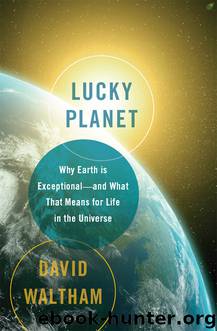Lucky Planet by David Waltham

Author:David Waltham [Waltham, David]
Language: eng
Format: epub
ISBN: 9780465080823
Publisher: Basic Books
CHAPTER 9
FORCE OF NATURE
Is biological evolution alone powerful enough to explain life’s four billion years of success on an ever-changing world? The great diversity of organisms that share our planet certainly suggests that life is extraordinarily adaptable. Many people have been so impressed by this diversity and adaptability that they imagine life to be capable of colonizing almost any environment, eventually. This chapter will look at the power Nature has shown to adapt to almost everything Earth has thrown at it. However, as we’ll also see, Earth life does have limits, and these may be sufficiently severe and universal to restrict living creatures, particularly more complex organisms, to conditions only found on the very best of worlds.
There is no doubt that life is remarkably versatile, as one recently discovered animal demonstrates particularly well. This creature lives at the bottom of the Mediterranean Sea in pockets of salty water too dense to mix with the overlying sea. These seafloor brine pools completely lack oxygen and are largely inhabited by microorganisms that do not need or want the gas. But these microbes do not have the stagnant, saline pools to themselves; animals have penetrated even this apparently hostile environment. In 2010, Italian and Danish scientists reported the discovery of tiny creatures that spend their entire lifetimes living in these pools and that never, ever, breathe oxygen. The animals are about a third of a millimeter long and look a bit like miniature jellyfish, although this is misleading since they are a type of Loricifera, a group of animals much more closely related to insects and crustaceans, or even us, than jellyfish. Remarkably, this particular species of Loricifera gets its energy by combining carbohydrates with hydrogen sulphide produced by bacteria in these putrid brine pools. It would be hard to conceive of a better illustration of the extraordinary power of evolution than an animal that doesn’t need to breathe oxygen, and given examples like this, it is entirely understandable that many observers believe life will thrive under almost any conditions. Nevertheless, there are limits to life’s ability to cope with difficult conditions. To see why, we need to look at evolution in a bit more depth.
Modern evolutionary theory begins, in 1859, with Darwin’s publication of On the Origin of Species following his receipt of the letter from Alfred Russel Wallace mentioned in Chapter 2. However, the idea that species have gradually changed over time, that they have evolved, was widely accepted well before then. The fossil evidence that ancient animals and plants were different from modern ones was overwhelming, and the case was strengthened even further by centuries of thorough anatomy showing clear family resemblances under the skins of many species. The reality of evolution was plain for all to see, and many people had discussed it in the late eighteenth and early nineteenth centuries. Darwin’s contribution was to propose a convincing mechanism for evolution, and his explanation has all the elegance and inevitability of a well-crafted mathematical theorem. He noted that offspring are similar to, but slightly different from, their parents and siblings.
Download
This site does not store any files on its server. We only index and link to content provided by other sites. Please contact the content providers to delete copyright contents if any and email us, we'll remove relevant links or contents immediately.
| Aeronautics & Astronautics | Astronomy |
| Astrophysics & Space Science | Comets, Meteors & Asteroids |
| Cosmology | Mars |
| Solar System | Star-Gazing |
| Telescopes | UFOs |
Tools of Titans by Timothy Ferriss(8357)
Turbulence by E. J. Noyes(8014)
Secrets of Antigravity Propulsion: Tesla, UFOs, and Classified Aerospace Technology by Ph.D. Paul A. Laviolette(5363)
Astrophysics for People in a Hurry by Neil DeGrasse Tyson(5172)
Room 212 by Kate Stewart(5098)
Design of Trajectory Optimization Approach for Space Maneuver Vehicle Skip Entry Problems by Runqi Chai & Al Savvaris & Antonios Tsourdos & Senchun Chai(5058)
Pale Blue Dot by Carl Sagan(4990)
The David Icke Guide to the Global Conspiracy (and how to end it) by David Icke(4693)
A Journey Through Divination and Astronomy by Publishing Pottermore(4373)
Goodbye Paradise(3795)
Apollo 8 by Jeffrey Kluger(3700)
COSMOS by Carl Sagan(3615)
The Five People You Meet in Heaven by Mitch Albom(3548)
Losing the Nobel Prize by Brian Keating(3531)
How to Read Water: Clues and Patterns from Puddles to the Sea (Natural Navigation) by Tristan Gooley(3454)
Brief Answers to the Big Questions by Stephen Hawking(3415)
How to Read Nature by Tristan Gooley(3322)
The Order of Time by Carlo Rovelli(3179)
A Brief History of Time by Stephen Hawking(3013)
